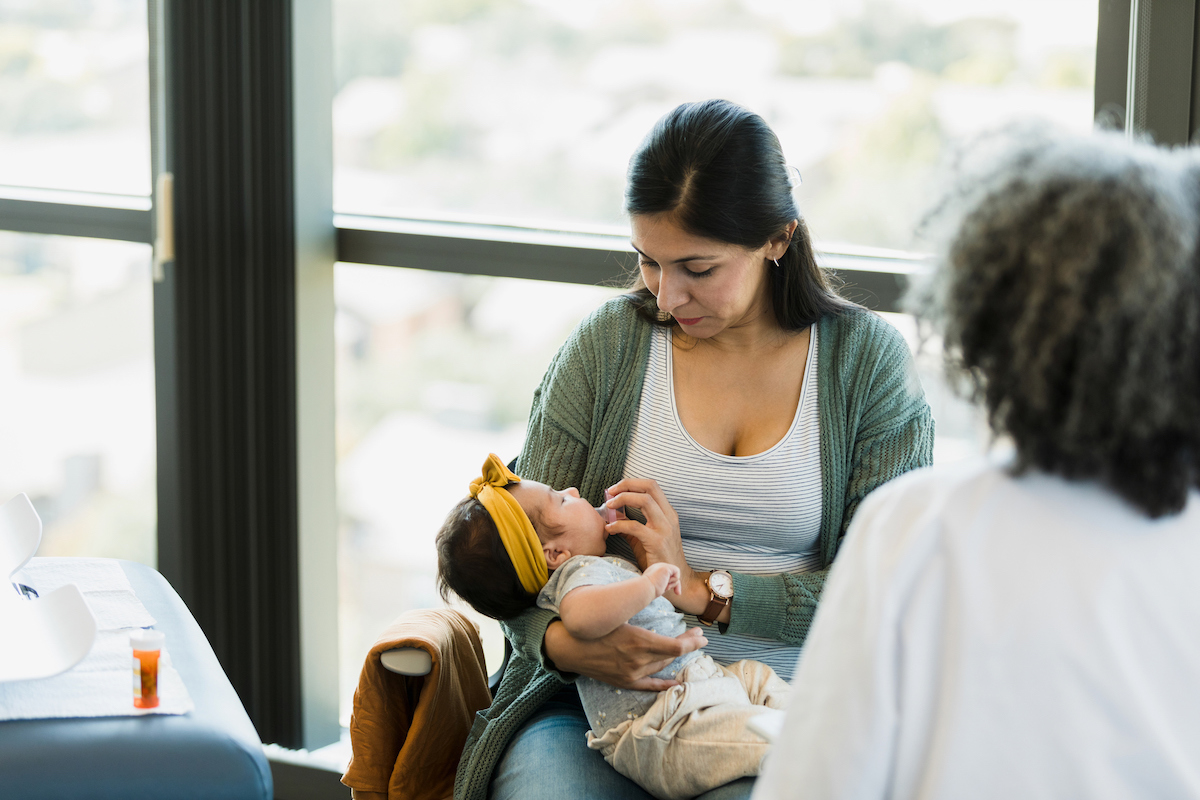About 18% of women in the U.S. use antidepressants regularly. By far the most common antidepressants are the selective serotonin reuptake inhibitor (SSRI) class, making up about three-quarters of prescriptions. The period of trying to conceive through postpartum can be times of significant stress and mental health challenges, making the question of the use of SSRIs during these periods a salient one for many people.
However, people often find that there aren’t easy answers to the most basic questions: Does my SSRI affect my fertility? Should I keep taking it during pregnancy? What about during breastfeeding? More troubling, when these questions are discussed, the language can quickly turn to phrases like, Well, you can take it if you really feel like you need it. This approach reinforces the idea of maternal sacrifice being a key way we show love for our children. The message comes across as: only if you’re really selfish would you put your mental health needs above some possible risk to the infant.
But of course, a lot of people are enormously helped by SSRIs; they really do need them. It can be hard, though, to move forward with the choice to take these medications without understanding better the data behind the possible risks to the child. I am going to run through that data today — what there is of it — and then return to this question of framing the choice.
I am going to focus the data discussion on SSRIs. There is significantly less research on other classes of antidepressants, but the research we have echoes the conclusions from the SSRI data.
Note: The first part of this discussion focuses on trying to conceive and pregnancy, and the next part on breastfeeding — feel free to skip down if that’s why you’re here!

SSRIs while trying to conceive
There are two main concerns here: potential risks to the fetus and impacts on fertility.
Considering first the risks to the fetus, there is little reason to stop using antidepressants while trying to conceive. First, as I get into below, the evidence on pregnancy is mixed, and for many people, it will make sense to continue taking their medications during pregnancy. Second, the half-life of these medications is short, meaning that if you stopped taking them when you found out you were pregnant, the exposure of the fetus would be minimal.
As for conception, there is some evidence that fertility is lower for women on antidepressants, but this is very hard to interpret causally since it is impossible to separate the effects from the impact of depression. Having depression may affect sexual behavior or be correlated with other factors that might make conception less likely.
In other words, the data is on your side if you continue to take SSRIs while trying to conceive.
SSRIs in pregnancy
Studying the impacts of SSRIs in pregnancy is challenging, due in part to the lack of randomized controlled trials. From a statistical standpoint, our ideal approach to this empirical challenge would be to recruit a sample of pregnant people who were candidates for antidepressants, randomize whether they were treated with medication, and then observe outcomes for their children.
This experiment is likely to be infeasible for both ethical and practical reasons. On the ethical side, one could argue that it is unethical either to expose infants to SSRIs or to withhold them from pregnant people for research purposes. Also, generally, we do not like to experiment on pregnant women, which is a broader issue for drug access. Practically, it is not likely to be an experiment that many women are going to be interested in participating in. Whatever the reason, we do not have evidence like this.
In the absence of this type of evidence, we must make use of observational studies that look for differences in birth outcomes or other childhood experiences based on pregnancy antidepressant exposure. A good aspect of these studies is that they tend to be extremely large. The data resources of many European countries make it possible to link together information on medical exams, drug treatments, and birth outcomes for entire populations.
The major issue with studying this problem, though, is that it is hard to separate the impact of mental health issues from the impact of antidepressants. This is important because, from an individual standpoint, if you need an antidepressant, the choice you face is to have untreated depression/anxiety or treated depression/anxiety. Researchers want to try to isolate the impact of treatment. But since antidepressant usage is correlated with other characteristics, our correlation-versus-causality problem is significant.
To see this in action, we can consider this 2021 paper on the possible link between SSRI exposure in pregnancy and autism spectrum disorder (ASD) or attention-deficit/hyperactivity disorder (ADHD) diagnoses in children. The first result in this meta-analysis is that children exposed to antidepressants in utero were 42% more likely to have an ASD diagnosis and 26% more likely to have an ADHD diagnosis. However, the study then showed that these effects were even larger if the researchers looked at maternal medication exposure before pregnancy only, even though those children were not exposed at all in utero. This points to a difference across these groups that is unlikely to be about the antidepressant exposure and suggests that the antidepressant exposure itself isn’t driving the diagnoses.
This issue is extreme when we are studying variables that relate to child mental health, but the problem is present in all of the analyses I’ll talk about below.
What are the major concerns?
Beyond ASD and ADHD diagnoses, there are three big categories of concern with antidepressants: (1) birth defects or higher mortality risks for infants, (2) complications for the mother, and (3) shorter-term newborn complications, possibly related to withdrawal.
In the first category, the evidence is reassuring. Among the most studied questions is the impact on birth defects, and studies that compare people with untreated depression to those who take SSRIs do not show increases, nor do studies that use a sibling-comparison design. Although some studies show elevated risks of cardiovascular issues in infants, the better studies of this — those that are able to adjust for more variables — do not. There is similarly no good evidence that antidepressant use impacts stillbirth, miscarriage, or infant death.
In the case of maternal complications, risk does seem to be elevated in two categories. One is postpartum hemorrhage (PPH) — heavy postpartum bleeding, which needs medical attention. A large registry study in Sweden showed a higher risk of PPH among those who took SSRIs, even relative to women with untreated depression. The second issue is preterm birth; a meta-analysis of data on preterm birth shows an elevation in risk. In both cases, it is important to note that the effects are small in absolute terms; there appears to be about a 1.5 percentage point increase in the PPH risk, for example.
Finally, we can turn to evidence on possible risks to the newborn, including the possibility of elevated NICU admission, respiratory issues, and a serious condition called persistent pulmonary hypertension. The best evidence on these comes from registry-based data in Sweden. The study covers about 740,000 infants, of whom 2.4% were exposed to SSRIs during gestation. The authors find that infants who are exposed to SSRIs, especially in later pregnancy, have a higher risk of NICU admission, respiratory issues, and pulmonary hypertension.
This paper, though scary, has very notable limitations. In particular, the comparison is of exposed and unexposed infants, but not between infants of mothers with depression who are treated versus untreated. When we look at the simple demographics, mothers who take SSRIs have many other risk factors. They are significantly more likely to be older, obese, or smokers; have diabetes, gestational diabetes, hypertension, or preeclampsia; use opioids or other neurotropic drugs or sedatives; and have a cesarean section.
These differences are large. The authors show their results both in raw form and adjusted for at least some of these variables. They find that the effects are much smaller after adjustment; since we observe only a subset of information about people, this leads to a lot of concern that further adjustment would further decrease the result.
The effects estimated in this paper are small. In the case of persistent pulmonary hypertension, the authors estimate that it occurs at a rate of three in 1,000 among non-exposed newborns. Using their most controlled estimates, they would estimate an increase of less than one per 1,000 as a result of SSRI exposure. This is a small effect and, again, is likely an upper bound on what we would find if we could include more controls.
Navigating the decision
Pulling this all together is a bit challenging. The most convincing risk is maternal hemorrhage. The most concerning data is on the early newborn results, but that is the least convincing evidence. But actually, stepping back, none of this evidence is ironclad.
My sense is that the lack of certainty here, and the complexity of the problem, is what leads us to the language of “Well, if you feel like you need it … ” In a distorted way, this is trying to capture the idea of tradeoffs.
Antidepressants in pregnancy provide tremendous benefits to people who need them. They also may carry some small risks. Because of these small risks, we wouldn’t simply encourage everyone to take an SSRI during pregnancy (or otherwise). We’d encourage people to take them if the benefits outweigh these small risks. “If you need it” is a poorly phrased way to say “consider the benefits.”
As with any tradeoff of this type, my view is that the decision is best made with the full picture of data. This data should also inform what we do to monitor.
For example, we could say some version of “This medicine may carry some small elevated risks if you continue to take it during pregnancy. This includes a small increase in the risk of postpartum hemorrhage and possibly some small risks to your baby right after they are born. We should be aware of these risks when we think about delivery, and you should be aware of them when considering whether or not to take it.”
My point in putting it this way is to say that there is some tradeoff, at least based on the best data we have. The fact that there is a tradeoff, though, doesn’t mean that SSRIs should be discontinued. For most people — maybe not all — the tradeoff is likely to favor continuing their SSRI prescription. If you are in the boat of deciding this, I hope the data will help.
A few specific questions:
My doctor told me to take Zoloft because there is more data on it. Is this true?
It is true that since Zoloft is the most popular first-line SSRI, there is the most data on it. However, the expert discussion of this is very clear that the information we have doesn’t suggest any difference in risk profile across different SSRIs. Moreover, getting back to benefits, people often respond differently to different SSRIs. If you are starting an SSRI during pregnancy, you’ll probably be started on Zoloft. But there is no reason to switch.
Should I move to a smaller dose?
None of the large-scale data we have compares across doses (and it would be hard to learn from that even if it did, since dose and depression severity are likely to be correlated). There is a logic to the idea that lower doses would lower risk, but they also may lower benefits. A general rule of taking the lowest dose that is effective holds, both for pregnant and nonpregnant individuals.
What if I stop later in pregnancy?
The study of newborn complications in Sweden is able to separate early versus late SSRI use, and it finds no elevated risk for use early in pregnancy. I would be reluctant to draw too many conclusions from this, given the issues with the comparison group, but it’s also true that some of the hypothesized mechanisms relate to newborn withdrawal, which would be more significant with later usage. Again, though, there are good reasons not to stop that need to be considered.
SSRIs while breastfeeding
This is easier. Antidepressants are passed through breast milk, but we have little or no evidence of negative impacts on infants. There are, of course, reports of infants who are fussy after nursing when mom is taking an antidepressant, but also, infants are fussy a lot.
On the flip side, postpartum depression and anxiety can impact early parenting in significant ways. I talked about that more in this post (which includes a depression screen). The huge benefits of treating depression and anxiety, combined with the very reassuring evidence on risks, make this choice a clear one.
As one expert review put it: “In women suffering from major depression and responding to a pharmacological treatment, introduction, or continuation of an SSRI should be encouraged in order to prevent maternal complications and to preserve maternal-infant bonding.”
The bottom line
- Studying the effects of SSRIs in pregnancy is challenging due to ethical and practical limitations that prevent randomized controlled trials. Based on the data we have, taking SSRIs in pregnancy for those who need it outweighs the relatively small risks (postpartum hemorrhage, preterm birth, and NICU admission) found in cited studies.
- A 2021 meta-analysis found that children were more likely to be diagnosed with ASD or ADHD if their moms took SSRIs during pregnancy, but the risk was even higher if the meds were taken only before pregnancy, suggesting the issue is more about differences between the moms than the medication itself.
- There is little reason to stop using antidepressants while trying to conceive. There is some evidence that fertility is lower for women on antidepressants, but it is very hard to interpret causally.
- An easier answer is regarding taking antidepressants while breastfeeding. While they do pass through the milk, there’s little to no evidence that this has negative impacts on infants, aside from some reports of fussier behavior. Postpartum depression and anxiety can have a far more negative impact on early childhood.





















Log in
On the advice of my midwife, OB, psychiatrist AND therapist, I continued taking Zoloft during my pregnancy. I had some severe complications during labor and delivery that resulted in my son needing to be resuscitated after birth, landing him in the NICU and me in the ICU. I will always, always remember the emergency peds surgeon, when I asked him “why did that happen” saying to me, “probably because you took SSRIs during pregnancy.” If I wasn’t already headed for PPD *that* comment certainly drop kicked me right over the edge. Three years and a lot of therapy later, after speaking to many doctors, pediatricians, OBs and other professionals I know that it was NOT my use of SSRIs that caused the situation (it was the missed preeclampsia). But the fact that someone who I should have been able to trust and rely on for good information, someone who was taking care of my newborn son at the hospital, had such confidence in his misinformation and a willingness to spew it on a new mom while she was hooked up to bags of blood and IVs of meds… no wonder there is so much judgmental and misleading information out there.
This story is heartbreaking; I am so sorry you went through this. I’m glad you found experts who ultimately led you to the truth here, but I cannot believe someone would be so callous and cruel in this moment. We are so quick to place blame, and so often on mothers, it’s almost breathtaking.
I really appreciate this article. I had postpartum depression after both of my pregnancies and took SSRIs only after the second. It had a profoundly positive impact on improving my mental health and my ability to bond with my baby, and I wish I could go back and tell myself to do it the first time. Really appreciate your work discussing the actual evidence here and destigmatizing the choice to take care of one’s own mental health.
I’m curious about the impact of SSRIs and pregnancy via IVF. I already have embryos frozen that we plan to implant later this year and my fertility is in good standing as per my doctor, but I recently started on an SSRI. Could the embryo still be impacted by the side effects such as increased risk of ASD or ADHD?